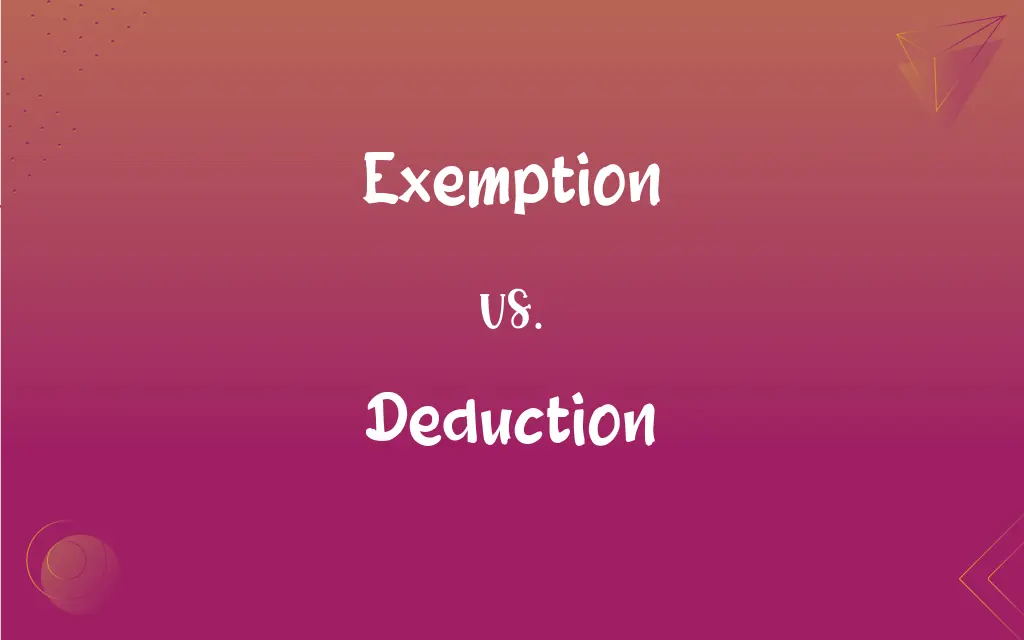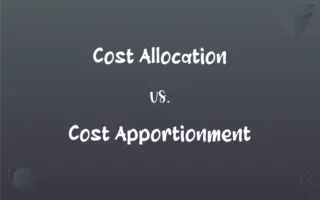Exemption vs. Deduction: What's the Difference?
Edited by Harlon Moss || By Janet White || Published on November 23, 2023
An exemption reduces taxable income based on specific criteria, while a deduction reduces taxable income based on expenses.

Key Differences
Exemption and Deduction are terms commonly associated with income tax. While both lead to a reduction in the taxable income, the basis for each is different. An exemption is an amount that is subtracted from one's income based on specific criteria, often associated with one's status, such as being a dependent.
On the other hand, a deduction is a reduction allowed from the total income based on certain eligible expenses. These expenses can range from business costs to specific personal expenditures, depending on the tax laws and guidelines. Deductions are expenses recognized by the tax authority as eligible to reduce taxable income.
While an exemption might be a set amount, a deduction can vary based on the actual expenses incurred. For instance, in tax systems that recognize a standard deduction, individuals might subtract a fixed amount from their income, or itemize and claim their actual qualifying expenses, whichever is greater.
Another distinguishing factor is that exemptions are often limited to particular categories of taxpayers. For instance, there may be exemptions for senior citizens, students, or people with disabilities. Deductions, however, are broader in nature and can be availed by a larger group, depending on the nature of the expense.
To sum it up, while both exemptions and deductions lead to reduced taxable income, exemptions are granted based on specific criteria or taxpayer status, whereas deductions are based on eligible expenses.
ADVERTISEMENT
Comparison Chart
Basis
Specific criteria or status.
Eligible expenses.
Variability
Often a fixed amount.
Varies based on actual expenses.
Applicability
Specific categories of taxpayers.
Broader group depending on expense nature.
Example
Dependent exemption.
Business expense deduction.
Purpose
Recognize specific taxpayer situations.
Recognize allowable expenses.
ADVERTISEMENT
Exemption and Deduction Definitions
Exemption
A tax concession based on one's status or criteria.
Students might be eligible for certain exemption benefits under the tax law.
Deduction
A subtraction from income based on specific eligible expenses.
Donating to charity can provide a tax deduction benefit.
Exemption
An allowance granted to reduce taxable income.
Being a senior citizen, she qualified for an additional tax exemption.
Deduction
A reduction in taxable income based on expenses.
Mortgage interest is a common tax deduction for homeowners.
Exemption
A reduction in taxable income based on specific criteria.
The tax code provides an exemption for each dependent in a household.
Deduction
An amount subtracted from gross income due to allowable costs.
She itemized her deductions to include medical expenses.
Exemption
A subtraction from gross income for tax purposes.
The new policy increased the exemption limit for low-income families.
Deduction
An expense recognized to reduce tax liability.
Business expenses provided significant deductions on his tax return.
Exemption
A relief from a particular tax obligation.
Charitable organizations often receive a tax exemption status.
Deduction
An allowance made from total income due to recognized expenditures.
The new tax reform modified the standard deduction amount.
Exemption
The act or an instance of exempting.
Deduction
The act of deducting; subtraction.
Exemption
The state of being exempt; immunity.
Deduction
An amount that is or may be deducted
Tax deductions.
Exemption
An exception of certain property from bankruptcy or taxation.
Deduction
The drawing of a conclusion by reasoning; the act of deducing.
Exemption
The deduction of a certain amount in the computation of net income with regard to taxation, allowed for an individual, that individual's dependents, and certain characteristics, such as blindness or age.
Deduction
The process of reasoning in which a conclusion follows necessarily from the stated premises; inference by reasoning from the general to the specific.
Exemption
Excuse from performance of a legal duty, such as release from serving in the military or as a juror.
Deduction
A conclusion reached by this process.
Exemption
An act of exempting.
Deduction
That which is deducted; that which is subtracted or removed
Exemption
The state of being exempt; immunity.
Deduction
A sum that can be removed from tax calculations; something that is written off
You might want to donate the old junk and just take the deduction.
Exemption
A deduction from the normal amount of taxes.
Deduction
(logic) A process of reasoning that moves from the general to the specific, in which a conclusion follows necessarily from the premises presented, so that the conclusion cannot be false if the premises are true.
Exemption
Freedom from a defect or weakness.
Deduction
A conclusion; that which is deduced, concluded or figured out
He arrived at the deduction that the butler didn't do it.
Exemption
The act of exempting; the state of being exempt; freedom from any charge, burden, evil, etc., to which others are subject; immunity; privilege; as, exemption of certain articles from seizure; exemption from military service; exemption from anxiety, suffering, etc.
Deduction
The ability or skill to deduce or figure out; the power of reason
Through his powers of deduction, he realized that the plan would never work.
Exemption
Immunity from an obligation or duty
Deduction
Act or process of deducing or inferring.
The deduction of one language from another.
This process, by which from two statements we deduce a third, is called deduction.
Exemption
A deduction allowed to a taxpayer because of his status (having certain dependents or being blind or being over 65 etc.);
Additional exemptions are allowed for each dependent
Deduction
Act of deducting or taking away; subtraction; as, the deduction of the subtrahend from the minuend.
Exemption
An act exempting someone;
He was granted immunity from prosecution
Deduction
That which is deduced or drawn from premises by a process of reasoning; an inference; a conclusion.
Make fair deductions; see to what they mount.
Deduction
That which is or may be deducted; the part taken away; abatement; as, a deduction from the yearly rent in compensation for services; deductions from income in calculating income taxes.
Deduction
A reduction in the gross amount on which a tax is calculated; reduces taxes by the percentage fixed for the taxpayer's income bracket
Deduction
An amount or percentage deducted
Deduction
Something that is inferred (deduced or entailed or implied);
His resignation had political implications
Deduction
Reasoning from the general to the particular (or from cause to effect)
Deduction
The act of subtracting (removing a part from the whole);
He complained about the subtraction of money from their paychecks
Deduction
The act of reducing the selling price of merchandise
FAQs
How does a deduction differ from an exemption?
A deduction reduces taxable income based on eligible expenses, while an exemption is based on specific criteria.
Are exemptions fixed amounts?
Often, exemptions are fixed amounts, but they can vary based on tax laws and individual circumstances.
Do all taxpayers get the same exemptions?
No, exemptions can vary based on factors like age, disability, or dependent status.
Are there limits on the amount one can deduct?
Deduction limits can exist based on the nature of the expense and tax regulations.
What is an exemption in tax terms?
An exemption is a reduction in taxable income based on specific criteria or taxpayer status.
Are business expenses a type of deduction?
Yes, legitimate business expenses can be deducted from taxable income.
Can deductions be itemized?
Yes, taxpayers can often choose between a standard deduction or itemizing their eligible expenses.
Can I claim both exemptions and deductions?
Yes, taxpayers can typically claim both exemptions and deductions, based on eligibility.
How do exemptions affect tax liability?
Exemptions reduce taxable income, which in turn lowers the overall tax liability.
Are exemptions and deductions available in all tax systems?
While many tax systems have exemptions and deductions, their nature and criteria can vary widely.
Is there a difference between personal and standard deductions?
Yes, a standard deduction is a fixed amount, while itemized personal deductions depend on actual expenses.
Can I lose my exemption benefits if I don't file taxes?
Failing to file taxes can lead to loss of benefits, including exemptions.
Can charitable donations be claimed as a deduction?
Yes, charitable donations often qualify as a tax deduction, subject to limits and criteria.
If I have no deductions, can I still claim exemptions?
Yes, deductions and exemptions are separate components of taxable income calculations.
How often do exemption and deduction amounts change?
Exemption and deduction amounts can change based on annual tax law adjustments or reforms.
How can I find out about the exemptions and deductions available to me?
Consulting tax guidelines, tax professionals, or the respective tax authority can provide clarity on available exemptions and deductions.
Do exemptions phase out at higher incomes?
Some tax systems phase out exemptions for high-income earners.
Can educational expenses be claimed as a deduction?
Often, certain educational expenses can be claimed as a deduction, depending on tax laws.
Is mortgage interest an eligible deduction?
In many tax systems, mortgage interest is a deductible expense.
Are there penalties for falsely claiming exemptions?
Yes, claiming false exemptions can result in penalties and back taxes.
About Author
Written by
Janet WhiteJanet White has been an esteemed writer and blogger for Difference Wiki. Holding a Master's degree in Science and Medical Journalism from the prestigious Boston University, she has consistently demonstrated her expertise and passion for her field. When she's not immersed in her work, Janet relishes her time exercising, delving into a good book, and cherishing moments with friends and family.
Edited by
Harlon MossHarlon is a seasoned quality moderator and accomplished content writer for Difference Wiki. An alumnus of the prestigious University of California, he earned his degree in Computer Science. Leveraging his academic background, Harlon brings a meticulous and informed perspective to his work, ensuring content accuracy and excellence.






































































